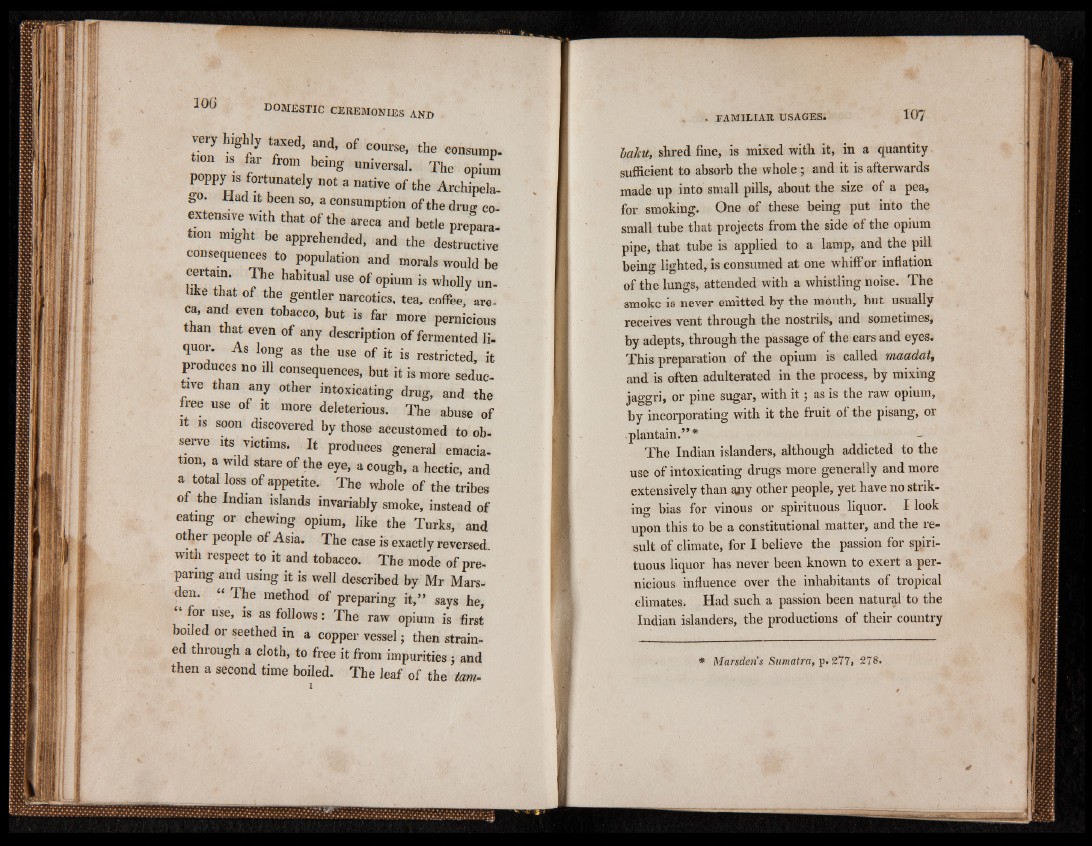
very highly taxed, and, of course, the consumption
is far from being universal. The opium
poppy is fortunateiy not a native of the Archipelago.
Had it been so, a consumption of the drug coextensive
with that of the areca and betle preparation
might be apprehended, and the destructive
consequences to population and morals would be
cm tain. The habitual use of opium is wholly unlike
that of the gentler narcotics, tea, coffee, areca,
and even tobacco, but is far more pernicious
than that even of any description of fermented liquor.
As long as the use of it is restricted, it
produces no ill consequences, but it is more seductive
than any other intoxicating drug, and the
free use of it more deleterious. The abuse of
it is soon discovered by those accustomed to observe
its victims. It produces general emaciation,
a wild stare of the eye, a cough, a hectic, and
a total loss of appetite. The whole of the tribes
of the Indian islands invariably smoke, instead of
eating or chewing opium, like the Turks, and
otljer people of Asia. The case is exactly reversed
with respect to it and tobacco. The mode of preparing
and using it is well described by Mr Mars-
den. “ The method of preparing it,” says he,
“ for use, is as follows: The raw opium is first
boiled or seethed m a copper vessel; then strained
through a cloth, to free it from impurities j and
then a second time boiled. The leaf of the tarnbaku,
shred fine, is mixed with it, in a quantity
sufficient to absorb the whole ; and it is afterwards
made up into small pills, about the size of a pea,
for smoking. One of these being put into the
small tube that projects from the side of the opium
pipe, that tube is applied to a lamp, and the pill
being lighted, is consumed at one whiff or inflation
of the lungs, attended with a whistling noise. The
smoke is never emitted by the mouth, but usually
receives vent through the nostrils, and sometimes,
by adepts, through the passage of the ears and eyes.
This preparation of the opium is called mci(idcitt
and is often adulterated in the process, by mixing
jaggri, or pine sugar, with i t ; as is the raw opium,
by incorporating with it the fruit of the pisang, or
-plantain.” *
The Indian islanders, although addicted to the
use of intoxicating drugs more generally and more
extensively than any other people, yet have no striking
bias for vinous or spirituous liquor. I look
upon this to be a constitutional matter, and the result
of climate, for I believe the passion for spirituous
liquor has never been known to exert a pernicious
influence over the inhabitants of tropical
climates. Had such a passion been natural to the
Indian islanders, the productions of their country
* Marsden's Sumatra, p. 277» 278.